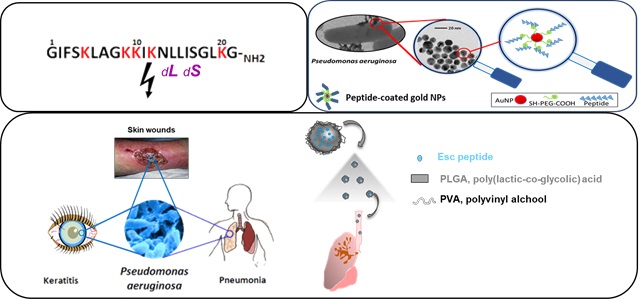PROJECTS
Development of peptide-based formulation for treatment of bacterial infection
Antimicrobial activity assays to evaluate the inhibition of microbial growth as well as the killing activity against both planktonic and biofilm forms of microbial strains by peptide molecules in their soluble free form or after encapsulation into biodegradable polymeric nanoparticles (NPs) made of poly(lactic-co-glycolic) acid. These latter represent an excellent strategy to (i) overcome biological barriers (i.e. the sticky mucus lying the airways epithelia, mostly in CF) that usually interfere with the antibiotic treatment; and to (ii) provide a sustained drug release, limiting the number of drug administrations and side-effects.
The antimicrobial activity of the compounds is tested under both standard and pathophysiological conditions. e.g. in the presence of lung mucus.
Furthermore, the antimicrobial activity of gold-nanoparticles coated with selected peptides are investigated
In parallel, additional non antimicrobial properties e.g. wound healing activity are investigated by in vitro assays to evaluate the effect of the selected compounds on the cell migration, when used in their soluble free or encapsulated forms.

Collaborators:
Prof. Francesca Ungaro, Dr. Ivana d’Angelo, Department of Pharmacy, University of Napoli Federico II, Naples, Italy
Prof. Y. Peter Di, Department of Environmental and Occupational Health, Pittsburgh University, Pittsburgh USA
Dr. Jesus Martinez de la Fuente CSIC-University of Zaragoza, Zaragoza, Spain
Prof. Surajit Bhattacharyya, School of Biological Sciences, Nanyang Technological University, Singapore
